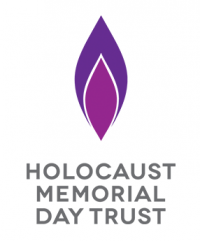Holocaust memorial day
 HMDT logo | |
| Date | 27 January |
|---|---|
| Website | http://hmd.org.uk/ |
| Type | Commemoration |
| Description | Annual national and international memorial day |
"Holocaust Memorial Day" (HMD) is a national commemoration day in many of the 46 countries that endorsed the Stockholm Declaration[1] of 27 January 2000 (not to be confused with the 1972 UN declaration on the Human environment of the same name). In 2006 the United Nations General Assembly designated 27 January - the anniversary of the liberation of Auschwitz-Birkenau by the Soviet Red Army - as "International Holocaust Remembrance Day" [2]. Although the Official Narrative's of HMD's and their respective promotional efforts in individual countries vary in their mention and inclusion of human wartime suffering other than that of the Jews of Nazi Germany, the alleged uniqueness of "The Holocaust" and the primacy of Jewish suffering is maintained in all of them.
Contents
HMD in the UK
The principle promoting organisation in the UK is the registered charity, "The Holocaust Memorial Day Trust" [3] (HMDT) which explains it thus:
A commemoration day in the UK dedicated to the remembrance of those who suffered in The Holocaust, under Nazi Persecution, and in subsequent genocides in Cambodia, Rwanda, Bosnia (Srebrenica) and Darfur. It was first held in January 2001 and has been on the same date every year since. [4] [5]
"Subsequent genocides"
The inclusion of "subsequent genocides" doubtless succeeds in making the occasion more inclusive but, quite apart from serious - but taboo - problems with the Official Narrative of The Holocaust itself - as outlined on its Wikispooks page and the documents linked therefrom - this selection of events from the vast list that on HMD criteria most certainly qualify as "Genocides" - is bizarre.
There is no mention of the 3 million German civilians from among the 15 million expelled from their ancestral homes after WWII, that were killed in the most brutal and barbaric ways imaginable; No mention of the 1 million or so German Wermacht personnel who died from starvation and exposure in allied internment camps after WWII; no mention of the 5 million Korean, 3 million Vietnamese and 1 million+ Middle-Eastern civilians killed by western bombing campaigns post WWII; and especially no mention of the Palestinian genocide through 1948 that was midwife to the modern Jewish state of Israel and which continues to this day.
It is clear that, in deference to what is essentially the excercise of Judaic power, western populations are required to be extremely selective and politically correct in their remembrance of the civilian casualties of war.
Influence of Historical revisionism
Whilst the basics of the three fundamental tenets of The Holocaust official narrative remain in place, viz:
- extermination as official policy
- gas chambers using Zyklon-B as the primary execution method and
- the number of Jews killed as 6 million,
there has been a marked change in the "extermination gas chambers" narrative part, at least by the UK guardians of it. Much as past claims of "lampshades made of human skin" and "soap made from human fats", there is now no reference to the similarly absurd and hitherto ubiquitous claims of the use of cycanide gas producing crystals known as "Zyklon-B". Now "carbon monoxide from tank engines" is the only mention of poison gas (although the carbon monoxide content of diesel engines is small - being some 28 times less than that of petrol engines [6] - and therefore seriously problematical too), and gas chambers themselves are relegated to a relatively minor proportion of the 6 million alleged total killed [7] This is another small victory for Holocaust revisionists (otherwise known as "Holocaust deniers and one which is owed to people such as Professor Robert Faurisson, Fred Leuchter and Germar Rudolf, all of whom have paid dearly in terms of imprisonment, loss of career and physical assaults, for their temerity in researching and publishing on this most taboo of subjects.
Jewish ethos and control of HDMT
HMDT says that its Board of Trustees comprises 15 members.[8] It provides details of 12 of them, one of whom - David Cesarani - died in October 2015.[9] . As of 25 January, 10 Trustees were listed on the organisation's Charities Commission page. [3]
Of the 12 Trustees listed on the HMDT web site, at least 6 are Jewish, with Jews in all the leadership roles. For an organisation with pretentions to universal appeal and relevance, to have 50%+ of its leadership drawn from the miniscule minority of just 0.4% of the population that hosts it, is clearly vastly excessive by any reasonable standard. It does however demonstrate the essentially Jewish nature of Holocaust Memorial Day and is consistent with the entire vast enterprise known as The Holocaust Industry of which it is an integral part.
Related Document
| Title | Type | Publication date | Author(s) | Description |
|---|---|---|---|---|
| Document:Pro-Israel outrage over BBC coverage of Holocaust memorial | Article | 25 January 2020 | Orla Guerin at the Yad Vashem Holocaust memorial: “Young soldiers troop in to share the binding tragedy of the Jewish people. The state of Israel is now a regional power. For decades it has occupied Palestinian territories. But some here will always see their nation through the prism of persecution and survival.” |
References
- ↑ "The Stockholm Declaration" HMDT website
- ↑ International Holocaust Remembrance Day - Wikipedia page
- ↑ a b HMDT Charities Commission entry
- ↑ About Holocaust Memorial Day - HMDT web site
- ↑ Holocaust Memorial Day (UK) - Wikipedia page
- ↑ Diesel exhaust - Wikipedia page
- ↑ Extermination camps - HMDT web site
- ↑ HMDT Board of Trustees - HMDT web site 15 January 2016
- ↑ David Cesarani - Wikipedia page 25 January 2015